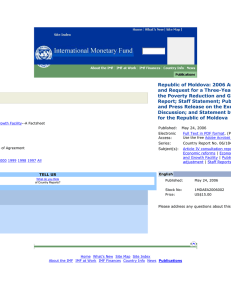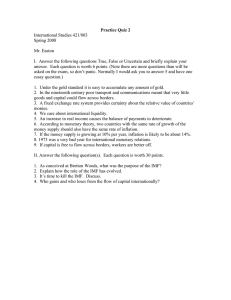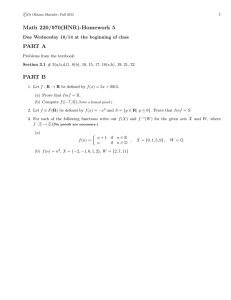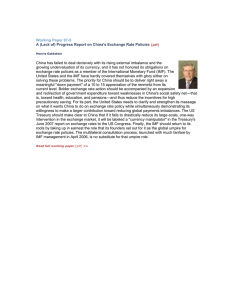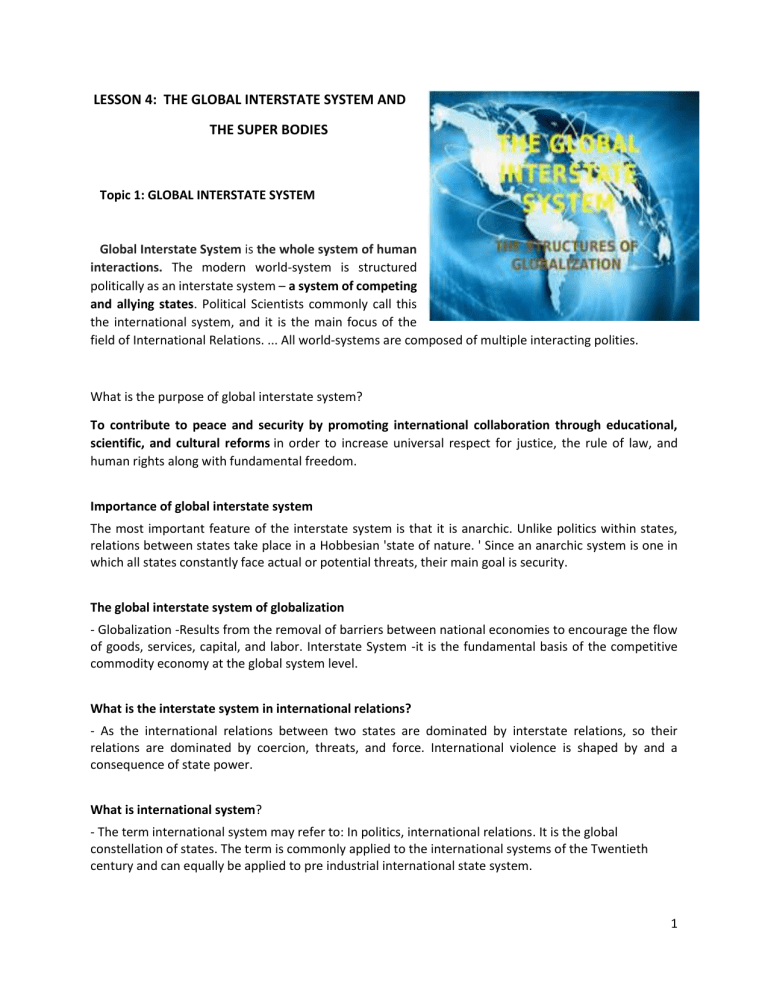
LESSON 4: THE GLOBAL INTERSTATE SYSTEM AND THE SUPER BODIES Topic 1: GLOBAL INTERSTATE SYSTEM Global Interstate System is the whole system of human interactions. The modern world-system is structured politically as an interstate system – a system of competing and allying states. Political Scientists commonly call this the international system, and it is the main focus of the field of International Relations. ... All world-systems are composed of multiple interacting polities. What is the purpose of global interstate system? To contribute to peace and security by promoting international collaboration through educational, scientific, and cultural reforms in order to increase universal respect for justice, the rule of law, and human rights along with fundamental freedom. Importance of global interstate system The most important feature of the interstate system is that it is anarchic. Unlike politics within states, relations between states take place in a Hobbesian 'state of nature. ' Since an anarchic system is one in which all states constantly face actual or potential threats, their main goal is security. The global interstate system of globalization - Globalization -Results from the removal of barriers between national economies to encourage the flow of goods, services, capital, and labor. Interstate System -it is the fundamental basis of the competitive commodity economy at the global system level. What is the interstate system in international relations? - As the international relations between two states are dominated by interstate relations, so their relations are dominated by coercion, threats, and force. International violence is shaped by and a consequence of state power. What is international system? - The term international system may refer to: In politics, international relations. It is the global constellation of states. The term is commonly applied to the international systems of the Twentieth century and can equally be applied to pre industrial international state system. 1 Topic 2: SUPERBODIES: UNITED NATIONS & WBIMF IN THE CONTEMPORARY WORLD In the blockbuster, sci fi movie, Star Wars, it was the company of Luke Skywalker (Mark Hamill) and Han Solo (Harrison Ford), captain of the Millennium Falcon, work together with the companionable droid duo R2-D2 (Kenny Baker) and C-3PO (Anthony Daniels) who came to rescue hostage Princess Leia (Carrie Fisher) of the Rebel Alliance, and restore freedom and justice to the Galaxy. For us, living in the planet Earth, who will stand as mediator, as judge or peace advocate when war among nations happens. Of course, we can’t call the Millennium Falcon to help us. Who do you think will resolve the conflict between countries or among countries? In this contemporary world, we are governed by a super body, the United Nations. This is the one who will intervene, hear and resolve disputes among its member nations. The Philippines is one of the members. There 193 member states of the United Nations (UN). The United Nation was founded in 1945, just after the Second World War. The main organs of the UN are the General Assembly, the Security Council, the Economic and Social Council, the Trusteeship Council, the International Court of Justice, and the UN Secretariat. 2.1. UNITED NATIONS ORGANIZATIONAL BODY 2.1.1 General Assembly The General Assembly is the main deliberative, policymaking and representative organ of the UN. All 193 Member States of the UN are represented in the General Assembly, making it the only UN body with universal representation. Each year, in September, the full UN membership meets in the General Assembly Hall in New York for the annual General Assembly session, and general debate, which many heads of state attend and address. Decisions on important questions, such as those on peace and security, admission of new members and budgetary matters, require a two-thirds majority of the General Assembly. Decisions on other questions are by simple majority. The General Assembly, each year, elects a GA President to serve a one-year term of office. 2 2.1.2. Security Council The Security Council has primary responsibility, under the UN Charter, for the maintenance of international peace and security. It has 15 Members (5 permanent and 10 non-permanent members). Each Member has one vote. Under the Charter, all Member States are obligated to comply with Council decisions. The Security Council takes the lead in determining the existence of a threat to the peace or act of aggression. It calls upon the parties to a dispute to settle it by peaceful means and recommends methods of adjustment or terms of settlement. In some cases, the Security Council can resort to imposing sanctions or even authorize the use of force to maintain or restore international peace and security. The Security Council has a Presidency, which rotates, and changes, every month. Subsidiary Organs in the UN Security Council Under Article 29 of the Charter of the United Nations, the Security Council “may establish such subsidiary organs as it deems necessary for the performance of its functions”. Here are the following Commissions and Investigative Bodies. Sanctions and Other Committees Standing and Ad hoc Committees Groups and Panels International Tribunals Missions of the Security Council and the Secretary-General The Peacebuilding Commission Peacekeeping Missions Political Missions and Offices Representatives, Mediators, Coordinators, and Good Offices Working Groups Subsidiary Organs Proposed but Not Established Other Material on Subsidiary Organs 2.1.3. Economic and Social Council The Economic and Social Council is the principal body for coordination, policy review, policy dialogue and recommendations on economic, social and environmental issues, as well as implementation of internationally agreed development goals. It serves as the central mechanism for activities of the UN system and its specialized agencies in the economic, social and environmental fields, supervising subsidiary and expert bodies. 3 It has 54 Members, elected by the General Assembly for overlapping three-year terms. It is the United Nations’ central platform for reflection, debate, and innovative thinking on sustainable development. 2.1.4. Trusteeship Council The Trusteeship Council was established in 1945 by the UN Charter, under Chapter XIII, to provide international supervision for 11 Trust Territories that had been placed under the administration of seven Member States, and ensure that adequate steps were taken to prepare the Territories for selfgovernment and independence. By 1994, all Trust Territories had attained self-government or independence. The Trusteeship Council suspended operation on 1 November 1994. By a resolution adopted on 25 May 1994, the Council amended its rules of procedure to drop the obligation to meet annually and agreed to meet as occasion required -- by its decision or the decision of its President, or at the request of a majority of its members or the General Assembly or the Security Council. 2.1.5. International Court of Justice The International Court of Justice is the principal judicial organ of the United Nations. Its seat is at the Peace Palace in the Hague (Netherlands). It is the only one of the six principal organs of the United Nations not located in New York (United States of America). The Court’s role is to settle, in accordance with international law, legal disputes submitted to it by States and to give advisory opinions on legal questions referred to it by authorized United Nations organs and specialized agencies. 2.1.6. Secretariat The Secretariat comprises the Secretary-General and tens of thousands of international UN staff members who carry out the day-to-day work of the UN as mandated by the General Assembly and the Organization's other principal organs. The Secretary-General is chief administrative officer of the Organization, appointed by the General Assembly on the recommendation of the Security Council for a five-year, renewable term. UN staff members are recruited internationally and locally, and work in duty stations and on peacekeeping missions all around the world. But serving the cause of peace in a violent world is a dangerous occupation. Since the founding of the United Nations, hundreds of brave men and women have given their lives in its service. 4 2.2. UNDERTAKINGS OF UNITED NATIONS DOES Since its establishment in 1945, the United Nations has been active in extensive areas including peace-keeping, arms control, the North-South problem, social and human rights issues. 2.2.1. Maintain International Peace and Security The United Nations came into being in 1945, following the devastation of the Second World War, with one central mission: the maintenance of international peace and security. The UN does this by working to prevent conflict; helping parties in conflict make peace; peacekeeping; and creating the conditions to allow peace to hold and flourish. These activities often overlap and should reinforce one another, to be effective. The UN Security Council has the primary responsibility for international peace and security. The General Assembly and the Secretary-General play major, important, and complementary roles, along with other UN offices and bodies. 2.2.2. Protect Human Rights The term “human rights” was mentioned seven times in the UN's founding Charter, making the promotion and protection of human rights a key purpose and guiding principle of the Organization. In 1948, the Universal Declaration of Human Rights brought human rights into the realm of international law. Since then, the Organization has diligently protected human rights through legal instruments and on-the-ground activities. 2.2.3. Deliver Humanitarian Aid One of the purposes of the United Nations, as stated in its Charter, is "to achieve international cooperation in solving international problems of an economic, social, cultural, or humanitarian character." The UN first did this in the aftermath of the Second World War on the devastated continent of Europe, which it helped to rebuild. The Organization is now relied upon by the international community to coordinate humanitarian relief operations due to natural and man-made disasters in areas beyond the relief capacity of national authorities alone. 2.2.4. Promote Sustainable Development From the start in 1945, one of the main priorities of the United Nations was to “achieve international co-operation in solving international problems of an economic, social, cultural, or 5 humanitarian character and in promoting and encouraging respect for human rights and for fundamental freedoms for all without distinction as to race, sex, language, or religion.” Improving people’s well-being continues to be one of the main focuses of the UN. The global understanding of development has changed over the years, and countries now have agreed that sustainable development – development that promotes prosperity and economic opportunity, greater social well-being, and protection of the environment – offers the best path forward for improving the lives of people everywhere. 2.2.5. Uphold International Law The UN Charter, in its Preamble, set an objective: "to establish conditions under which justice and respect for the obligations arising from treaties and other sources of international law can be maintained". Ever since, the development of, and respect for international law has been a key part of the work of the Organization. This work is carried out in many ways - by courts, tribunals, multilateral treaties - and by the Security Council, which can approve peacekeeping missions, impose sanctions, or authorize the use of force when there is a threat to international peace and security, if it deems this necessary. These powers are given to it by the UN Charter, which is considered an international treaty. As such, it is an instrument of international law, and UN Member States are bound by it. The UN Charter codifies the major principles of international relations, from sovereign equality of States to the prohibition of the use of force in international relations. 2.3. OTHER INTERNATIONAL ORGANIZATIONS 2.3.1. The Organization for Economic Cooperation and Development (OECD) The OECD is an organization providing a forum for developed countries which share fundamental values and principles of politics and economy to freely discuss a broad range of topics other than politics and military affairs. Serving as the world opinion leader, the OECD has been searching for ways to ensure sustainable development of the world by identifying and analyzing potential problems which may confront the international community in the future. For instance, the OECD became concerned with the global environmental problem long before the problem came to attract attention worldwide as seen today. Accordingly, it has studied the problem from all angles by giving full play to its expertise in economic analysis. Also, the OECD has recently established the Center for Cooperation in Changing European Economies and is about to play a leading role in integrating East European countries into the world economy by providing these rapidly changing countries with knowledge and know-how on the market economy of OECD member countries. 6 Japan, highly appreciating such roles by the OECD, has actively taken part in all discussions at the OECD and extended financial contributions comparable to those of the United States. Thus, Japan has played a leading role matching its international presence. 2.3.2. International Monetary Fund (IMF) The IMF has been serving as the central pillar of the international financial system and playing an important part in promoting policy coordination among developed countries and dealing with the accumulated debt problem. In the future, it is expected to play an active role in assisting in reforms in Eastern Europe and promoting the "New Debt Strategy ". At its Interim Committee held in May 1990, a need to further strengthen the IMF's financial position and measures for delinquent countries was emphasized. The committee then agreed on the 9th quota increase as well as the third amendment of its articles. As a result, by the end of 1991, IMF's capital resources will have been increased by 50% and the amendments of articles allowing the IMF to suspend the voting right of delinquent countries will have taken effect. In connection with the 9th quota increase, Japan shared second place with West Germany in terms of quotas which form the basis of rights and duties related to the IMF. 2.4. WORLD BANK (WB) AND THE INTERNATIONAL MONETARY FUND (IMF) The International Monetary Fund (IMF) and the World Bank (WB) are institutions in the United Nations system. They share the same goal of raising living standards in their member countries. Their approaches to this goal are complementary, with the IMF focusing on macroeconomic and financial stability issues and the World Bank concentrating on long-term economic development and poverty reduction. The International Monetary Fund and the World Bank were both created at an international conference convened in Bretton Woods, New Hampshire, United States in July 1944. The goal of the conference was to establish a framework for economic cooperation and development that would lead to a more stable and prosperous global economy. While this goal remains central to both institutions, their work is constantly evolving in response to new economic developments and challenges The IMF’s mandate The IMF promotes international monetary cooperation and provides policy advice and capacity development support to help countries build and maintain strong economies. 7 The IMF also provides medium-term loans and helps countries design policy programs to solve balance of payments problems when sufficient financing cannot be obtained to meet net international payments. IMF loans are short and medium term and funded mainly by the pool of quota contributions that its members provide. IMF staffs are primarily economists with wide experience in macroeconomic and financial policies. The World Bank’s mandate The World Bank promotes long-term economic development and poverty reduction by providing technical and financial support to help countries reform certain sectors or implement specific projects— such as building schools and health centers, providing water and electricity, fighting disease, and protecting the environment. World Bank assistance is generally long term and is funded both by member country contributions and through bond issuance. World Bank staffs are often specialists on particular issues, sectors, or techniques. Reducing debt burdens The IMF and World Bank have worked together to reduce the external debt burdens of the most heavily indebted poor countries under the Heavily Indebted Poor Countries (HIPC) Initiative and the Multilateral Debt Relief Initiative (MDRI). To date, debt reduction packages under the HIPC Initiative have been approved for 36 countries out of 39 eligible countries providing $76 billion in debt-service relief over time. The IMF and World Bank continue to collaborate in assisting low-income countries achieve their development goals without creating future debt problems. IMF and Bank staff jointly prepare country debt sustainability analyses under the Debt Sustainability Framework (DSF) developed by the two institutions. They continue to help low-income countries achieve their development goals without creating future debt problems. IMF and Bank staffs jointly prepare country debt sustainability analyses under the Debt Sustainability Framework (DSF) developed by the two institutions. 8 Assessing financial stability The IMF and the World Bank are also working together to make financial sectors in member countries resilient and well regulated. The Financial Sector Assessment Program (FSAP) was introduced in 1999 to identify the strengths and vulnerabilities of a country's financial system and recommend appropriate policy responses. The United Nations (UN) and the World Bank Group (WBG) have been discussing cooperation since the founding of the two organizations (1944 and 1945, respectively) which focuses on economic and social areas of mutual concern, such as reducing poverty, promoting sustainable development, and investing in people. 9 EVALUATION INSTRUCTION: Discuss the following (100-150 words only) Submit them at ecoben711@yahoo.com before our next class begins. A. Does a country need to have an ally? Would it be beneficial? B. How the WB-IMF helps their deeply buried creditor-countries or loan beneficiaries? C. As future Engineer, what would be your possible allied companies? Why? REFERENCES: https://www.un.org/en/sections/what-we-do/ https://www.mofa.go.jp/policy/other/bluebook/1990/1990-2-4.htm https://www.die-gdi.de/uploads/media/Download_the_full_text__74_kb__01.pdf https://www.un.org/securitycouncil/content/repertoire/subsidiary-organs-overview https://www.imf.org/en/About/Factsheets/Sheets/2016/07/27/15/31/IMF-World-Bank www.imf.org www.worldbank.org 10

